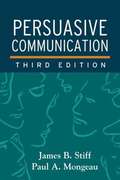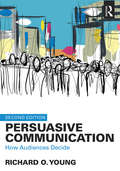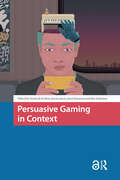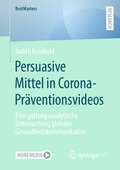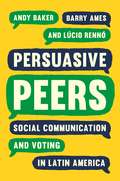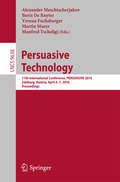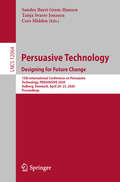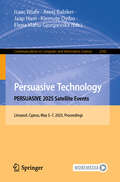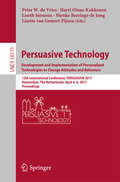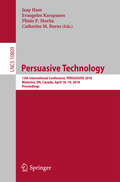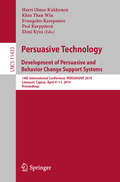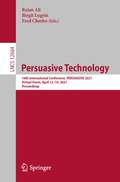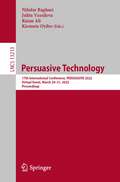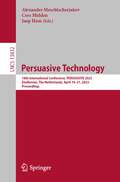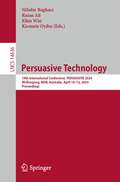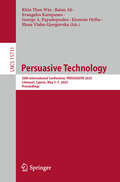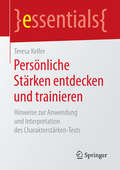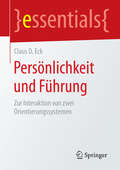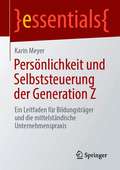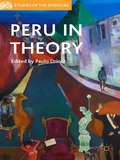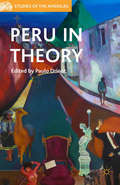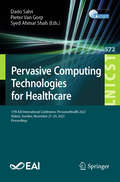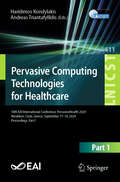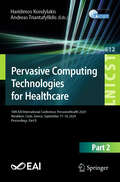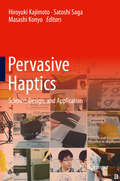- Table View
- List View
Persuasive Communication, Third Edition
by Paul A. Mongeau James B. StiffProviding an accessible integration of theory and research methods, this text prepares students to critically analyze persuasive appeals and to design effective messages and campaigns. The book draws on key ideas from both communication and social psychology to explore the mutual influence of cognitive and affective processes and the characteristics and production of messages. It gives the reader a solid grasp of foundational issues in persuasion research, the core components of persuasive transactions, and major theoretical models. Instructive concrete examples illustrate applications of the concepts in such settings as health promotion, political campaigns, the courtroom, and advertising. New to This Edition *Engaging topic boxes on college drinking, attitudes about same-sex marriage, the "birther" movement, and other timely issues. *New or expanded discussions of the integrative model of behavioral prediction, the use of guilt appeals, social media, individualized tailoring of political messages, and numerous other topics. *The latest data and theoretical perspectives. *Epilogue on current and future trends in the field.
Persuasive Communication: How Audiences Decide
by Richard O. YoungThis updated and expanded edition of Persuasive Communication offers a comprehensive introduction to persuasion and real-world decision making. Drawing on empirical research from social psychology, neuroscience, business communication research, cognitive science, and behavioral economics, Young reveals the thought processes of many different audiences—from investors to CEOs—to help students better understand why audiences make the decisions they make and how to influence them. The book covers a broad range of communication techniques, richly illustrated with compelling examples, including resumes, speeches, and slide presentations, to help students recognize persuasive methods that do, and do not, work. A detailed analysis of the emotions and biases that go into decision making arms students with perceptive insights into human behavior and helps them apply this understanding with various decision-making aids. Students will learn how to impact potential employers, clients, and other audiences essential to their success. This book will prove fascinating to many, and especially useful for students of persuasion, rhetoric, and business communication.
Persuasive Gaming in Context (Games and Play)
by Ben Schouten Joost Raessens Teresa de la Hera Jeroen JanszThe rapid developments in new communication technologies have facilitated the popularization of digital games, which has translated into an exponential growth of the game industry in recent decades. The ubiquitous presence of digital games has resulted in an expansion of the applications of these games from mere entertainment purposes to a great variety of serious purposes. In this edited volume, we narrow the scope of attention by focusing on what game theorist Ian Bogost has called 'persuasive games', that is, gaming practices that combine the dissemination of information with attempts to engage players in particular attitudes and behaviors. This volume offers a multifaceted reflection on persuasive gaming, that is, on the process of these particular games being played by players. The purpose is to better understand when and how digital games can be used for persuasion by further exploring persuasive games and some other kinds of persuasive playful interaction as well. The book critically integrates what has been accomplished in separate research traditions to offer a multidisciplinary approach to understanding persuasive gaming that is closely linked to developments in the industry by including the exploration of relevant case studies.
Persuasive Mittel in Corona-Präventionsvideos: Eine gattungsanalytische Untersuchung globaler Gesundheitskommunikation (BestMasters)
by Judith ReinboldIn diesem Buch werden 199 Videoclips, in denen Gesundheitsbehörden aus 17 Ländern Corona-Präventionsmaßnahmen nahelegen auf persuasive und gestalterische Mittel hin untersucht. . In einer soziologischen, qualitativ orientierten Medienproduktanalyse kristallisieren sich vier wesentliche inhaltliche Überzeugungsmittel heraus, nämlich sachliche Informationen, soziale Einflüsse, Zukunftsszenarien und Furchtappelle. Im Rahmen einer Gattungsanalyse werden diese als variable Merkmale der Binnenstruktur erfasst, die auf eine neu entstehende kommunikative Gattung bzw. Form (Corona-Präventionsvideos) hindeuten.
Persuasive Peers: Social Communication and Voting in Latin America (Princeton Studies in Global and Comparative Sociology)
by Barry Ames Andy Baker Lúcio RennóHow voting behavior in Latin America is influenced by social networks and everyday communication among peersIn Latin America’s new democracies, political parties and mass partisanship are not deeply entrenched, leaving many votes up for grabs during election campaigns. In a typical presidential election season, between one-quarter and one-half of all voters—figures unheard of in older democracies—change their voting intentions across party lines in the months before election day. Advancing a new theory of Latin American voting behavior, Persuasive Peers argues that political discussions within informal social networks among family members, friends, neighbors, coworkers, and acquaintances explain this volatility and exert a major influence on final voting choices.Relying on unique survey and interview data from Latin America, the authors show that weakly committed voters defer to their politically knowledgeable peers, creating vast amounts of preference change as political campaigns unfold. Peer influences also matter for unwavering voters, who tend to have social contacts that reinforce their voting intentions. Social influence increases political conformity among voters within neighborhoods, states, and even entire regions, and the authors illustrate how party machines use the social topography of electorates to buy off well-connected voters who can magnify the impact of the payoff.Persuasive Peers demonstrates how everyday communication shapes political outcomes in Latin America’s less-institutionalized democracies.
Persuasive Technology
by Alexander Meschtscherjakov Boris De Ruyter Verena Fuchsberger Martin Murer Manfred TscheligiThis book constitutes therefereed proceedings of the 11th International Conference on PersuasiveTechnology, PERSUASIVE 2016, held in Salzburg, Austria, in April 2016. The 27 revised full papers and 3 revised short papers presented were carefullyreviewed and selected from 73 submissions. The papers are grouped in topicalsections on individual differences, theoretical reflections, prevention andmotivation, methods and models, games and gamification, interventions forbehavior change, and design strategies and techniques.
Persuasive Technology. Designing for Future Change: 15th International Conference on Persuasive Technology, PERSUASIVE 2020, Aalborg, Denmark, April 20–23, 2020, Proceedings (Lecture Notes in Computer Science #12064)
by Sandra Burri Gram-Hansen Tanja Svarre Jonasen Cees MiddenThis book constitutes the refereed proceedings of the 15th International Conference on Persuasive Technology, PERSUASIVE 2020, held in Aalborg, Denmark, in April 2020. The 18 full papers presented in this book were carefully reviewed and selected from 79 submissions. The papers are grouped in the following topical sections: methodological and theoretical perspectives on persuasive design; persuasive in practice, digital insights; persuasive technologies for health and wellbeing; persuasive solutions for a sustainable future; and on security and ethics in persuasive technology.
Persuasive Technology. PERSUASIVE 2025 Satellite Events: Limassol, Cyprus, May 5–7, 2025, Proceedings (Communications in Computer and Information Science #2542)
by Jaap Ham Kiemute Oyibo Elena Vlahu-Gjorgievska Isaac Wiafe Areej BabikerThis book constitutes the proceedings of the PERSUASIVE 2025 Satellite Events, held together with the 20th International Conference on Persuasive Technology, in Limassol, Cyprus, during May 5–7, 2025.The 10 full papers and 5 short papers included in this book were carefully reviewed and selected from 19 submissions. They are organized in topical sections as follows: Late Breaking Results; Poster Presentations; Demonstrations and Artefacts and Doctoral Consortium Papers.
Persuasive Technology: 12th International Conference, PERSUASIVE 2017, Amsterdam, The Netherlands, April 4–6, 2017, Proceedings (Lecture Notes in Computer Science #10171)
by Peter W. de Vries, Harri Oinas-Kukkonen, Liseth Siemons, Nienke Beerlage-de Jong and Lisette van Gemert-PijnenThis book constitutes the refereed proceedings of the 12th International Conference on Persuasive Technology, PERSUASIVE 2017, held in Amsterdam, The Netherlands, in April 2017. The 23 revised full papers presented were carefully reviewed and selected from 85 submissions. The papers are grouped in topical sections on health(care), monitoring, and coaching; personality, personalization, and persuasion; motivations, facilitators, and barriers; design principles and strategies.
Persuasive Technology: 13th International Conference, Persuasive 2018, Waterloo, On, Canada, April 18-19, 2018, Proceedings (Lecture Notes in Computer Science #10809)
by Jaap Ham Evangelos Karapanos Plinio P. Morita Catherine M. BurnsThis book constitutes the refereed proceedings of the 13th International Conference on Persuasive Technology, PERSUASIVE 2018, held in Waterloo, ON, Canada, in April 2018. The 21 revised full papers and 4 short papers presented were carefully reviewed and selected from 59 submissions. The papers demonstrate how persuasive technologies can help solve societal issues. They explore new frontiers for persuasive technology, such as personalized persuasion, new sensor usage, uses of big data, and new ways of creating engagement through gaming or social connection, focusing on a variety of technologies (e.g., web, wearables, AI, and smart environments). The papers are organized in the following topical sections: social means to persuasion; nudging and just-in-time interventions; design principles and practices; persuasive games; personalization and tailoring; and theoretical reflections.
Persuasive Technology: 14th International Conference, PERSUASIVE 2019, Limassol, Cyprus, April 9–11, 2019, Proceedings (Lecture Notes in Computer Science #11433)
by Harri Oinas-Kukkonen Evangelos Karapanos Khin Than Win Pasi Karppinen Eleni KyzaThis book constitutes the refereed proceedings of the 14th International Conference on Persuasive Technology, PERSUASIVE 2019, held in Limassol, Cyprus, in April 2019. The 29 full papers presented were carefully reviewed and selected from 79 submissions. The papers demonstrate how persuasive technologies can help solve societal issues. They were subsequently grouped in the following topical sections: Terminologies and methodologies; self-monitoring and reflection; systems development process; drones and automotives; ethical and legal aspects; special application domains; motivation and goal setting; personality, age and gender; social support; user types and tailoring.
Persuasive Technology: 16th International Conference, PERSUASIVE 2021, Virtual Event, April 12–14, 2021, Proceedings (Lecture Notes in Computer Science #12684)
by Fred Charles Raian Ali Birgit LugrinThis book constitutes the refereed post-conference proceedings of the 16th International Conference on Persuasive Technology, PERSUASIVE 2021, held as a virtual event, in April 2021. The 17 full papers presented in this book together with 8 short papers were carefully reviewed and selected from 67 submissions. The papers are grouped in topical sections as follows: persuasive affective technology; digital marketing, ecommerce, etourism and smart ecosystems; and persuasion and education.
Persuasive Technology: 17th International Conference, PERSUASIVE 2022, Virtual Event, March 29–31, 2022, Proceedings (Lecture Notes in Computer Science #13213)
by Julita Vassileva Raian Ali Nilufar Baghaei Kiemute OyiboThis book constitutes the refereed post-conference proceedings of the 17th International Conference on Persuasive Technology, PERSUASIVE 2022, held as a virtual event, in March 2022. The 13 full papers presented in this book together with 7 short papers were carefully reviewed and selected from 46 submissions.
Persuasive Technology: 18th International Conference, PERSUASIVE 2023, Eindhoven, The Netherlands, April 19–21, 2023, Proceedings (Lecture Notes in Computer Science #13832)
by Alexander Meschtscherjakov Jaap Ham Cees MiddenThis book constitutes the refereed proceedings of the 18th International Conference on Persuasive Technology, PERSUASIVE 2023, held in Eindhoven, The Netherlands, April 19–21, 2023.The 24 full papers and 2 short papers included in this book were carefully reviewed and selected from 69 submissions. They were organized in topical sections as follows: Persuasive Technologies in Virtual and Augmented Reality; Persuasive Strategies; Persuasive Design and Applications; Methods for Tailoring and Personalisation; Artificial Persuasive Agents; Gamification; and Personal Factors in Persuasion.
Persuasive Technology: 19th International Conference, PERSUASIVE 2024, Wollongong, NSW, Australia, April 10–12, 2024, Proceedings (Lecture Notes in Computer Science #14636)
by Raian Ali Nilufar Baghaei Kiemute Oyibo Khin WinThis book constitutes the refereed post-conference proceedings the 19th International Conference on Persuasive Technology, PERSUASIVE 2024 held in Wollongong, NSW, Australia, during April 10–12, 2024. The 14 revised full papers and 8 short papers presented in this book were carefully reviewed and selected from 51 submissions. based on their content: methods for tailoring and personalization; persuasive design and applications, persuasive strategies; and persuasive technologies and ethics.
Persuasive Technology: 20th International Conference, PERSUASIVE 2025, Limassol, Cyprus, May 5-7, 2025, Proceedings (Lecture Notes in Computer Science #15711)
by George A. Papadopoulos Evangelos Karapanos Khin Than Win Raian Ali Kiemute Oyibo Elena Vlahu-GjorgievskaThis book constitutes the refereed proceedings of the 20th International Conference on Persuasive Technology, PERSUASIVE 2025, held in Limassol, Cyprus, during May 5–7, 2025. The 17 full papers and 6 short papers included in this book were carefully reviewed and selected from 49 submissions. They are organized in topical sections as follows: Personalized Persuasion; Theory and Exploration; Design and Solutions; Emotions and Behaviour; Behavior Change Games; Personality and Individual Differences.
Persönliche Stärken entdecken und trainieren: Hinweise zur Anwendung und Interpretation des Charakterstärken-Tests (essentials)
by Teresa KellerIn diesem essential stellt Teresa Keller aktuelle Erkenntnisse vor, wie die eigenen Stärken systematisch entdeckt und erforscht werden können. Damit diese auch im Alltag Anwendung finden, präsentiert die Autorin eine Vielzahl konkreter Anregungen und Impulse, wie Stärken bewusst trainiert und weiterentwickelt werden können. Der VIA-Charakterstärkentest, der eine schnelle und wissenschaftlich fundierte Möglichkeit der Stärkenerkennung ermöglicht, steht dabei im Mittelpunkt. Ergänzend werden weitere Methoden zur Entdeckung von Stärken vorgestellt. Eine ausführliche Erläuterung von 24 zentralen Stärken bietet Raum für Selbstreflexion und liefert überraschende Erkenntnisse. Denn das alltägliche Anwenden unserer fünf wichtigsten Stärken führt zu mehr Selbstbewusstsein, macht uns leistungsfähiger und erfolgreicher.
Persönlichkeit und Führung: Zur Interaktion von zwei Orientierungssystemen (essentials)
by Claus D. EckClaus D. Eck beschreibt das Zusammenspiel von zwei hochkomplexen Phänomenen: Führung und Persönlichkeit. Diese beiden Faktoren sind nicht voneinander trennbar und ständig aufeinander bezogen. Denn Führung wird nicht von Strukturen oder Systemen ausgeübt, sondern von Personen, und sie bezieht sich auf Personen. Die Persönlichkeit und die Führung sind im Sinne von Waldenfels "Hyperphänomene". Führen ist mehr als das Schließen der unvermeidlichen Lücken und somit auch mehr als eine Ergänzung der Managementfunktion. Was Führung ausmacht, sind der Wille und die Fähigkeit, auf andere einen maßgebenden Einfluss auszuüben, andere zu befähigen, selbsttätig die gegebenen Herausforderungen zu meistern. Führung ist punktuell, aber entscheidend, sie weiß sich immer auch zurückzunehmen und fördert so die relative Autonomie der Geführten.
Persönlichkeit und Selbststeuerung der Generation Z: Ein Leitfaden für Bildungsträger und die mittelständische Unternehmenspraxis (essentials)
by Karin MeyerDie Generation Z stellt konventionelle Konzepte in Frage. Von Bedeutung für den Erfolg von Unternehmen und Bildungsträgern ist es daher, sie als zukünftige Mitarbeiter und Lernende zu verstehen sowie deren Stärken und Schwächen zu kennen. Dieses essential gibt wesentliche Einblicke in die Persönlichkeit und Selbststeuerung der jungen Generation. Es werden Handlungsempfehlungen im Checklisten-Format abgebildet – mit dem Ziel, Bewährtes zum Wohl aller Beteiligten zu verändern.
Peru in Theory (Studies of the Americas)
by Paulo DrinotCan 'theory' teach us anything about Peru? Can 'Peru' teach us anything about theory? The chapters in this volume explore these questions by establishing a productive dialogue between Peru and theory. Focusing on institutional weakness and economic, social, gendered, racialized, and other forms of exclusion key issues in recent social scientific inquiry in Peru - the contributors to this volume assess the extent to which the analytical frameworks of a number of social and cultural theorists can inform, and, at the same time, be informed by, Peru as a case study.
Pervasive Computing Technologies for Healthcare: 17th EAI International Conference, PervasiveHealth 2023, Malmö, Sweden, November 27-29, 2023, Proceedings (Lecture Notes of the Institute for Computer Sciences, Social Informatics and Telecommunications Engineering #572)
by Pieter Van Gorp Dario Salvi Syed Ahmar ShahThis book constitutes the refereed proceedings of the 17th EAI International Conference on Pervasive Computing Technologies for Healthcare, PervasiveHealth 2023, held in Malmö, Sweden, during November 27-29, 2023. The 29 full papers and 6 short papers were selected from 90 submissions and are organized in thematic sessions as follows: Pervasive Mental Health; Privacy, Ethics and Regulations; Datasets and Big data Processing; Pervasive health for Carers; Pervasive Health in Clinical Practice; Remote Monitoring; Patient and User Aspects; Motion and rehabilitation; Workshop on the Internet of Things in Health Research; Posters and demos (non indexed annex).
Pervasive Computing Technologies for Healthcare: 18th EAI International Conference, PervasiveHealth 2024, Heraklion, Crete, Greece, September 17–18, 2024, Proceedings, Part I (Lecture Notes of the Institute for Computer Sciences, Social Informatics and Telecommunications Engineering #611)
by Andreas Triantafyllidis Haridimos KondylakisThe two-volume set LNICST 611 and LNICST 612 constitutes the refereed proceedings of the 18th EAI International Conference on Pervasive Computing Technologies for Healthcare, PervasiveHealth 2024, held in Heraklion, Crete, Greece, during September 17–18, 2024. The 45 full papers included in these proceedings were carefully reviewed and selected from 120 submissions. They were split in topical sections as follows: Part I : Patient Empowerment; Artificial Intelligence; Medical Imaging; Education. Part II : Education; mHealth and Telemonitoring; 3rd IOT-HR: Workshop on Internet of Things in Health Research; Posters
Pervasive Computing Technologies for Healthcare: 18th EAI International Conference, PervasiveHealth 2024, Heraklion, Crete, Greece, September 17–18, 2024, Proceedings, Part II (Lecture Notes of the Institute for Computer Sciences, Social Informatics and Telecommunications Engineering #612)
by Andreas Triantafyllidis Haridimos KondylakisThe two-volume set LNICST 611 and LNICST 612 constitutes the refereed proceedings of the 18th EAI International Conference on Pervasive Computing Technologies for Healthcare, PervasiveHealth 2024, held in Heraklion, Crete, Greece, during September 17–18, 2024. The 45 full papers included in these proceedings were carefully reviewed and selected from 120 submissions. They were split in topical sections as follows: Part I : Patient Empowerment; Artificial Intelligence; Medical Imaging; Education. Part II : Education; mHealth and Telemonitoring; 3rd IOT-HR: Workshop on Internet of Things in Health Research; Posters
Pervasive Haptics
by Hiroyuki Kajimoto Satoshi Saga Masashi KonyoThis book examines the state of the art in diverse areas of haptics (touch)-related research, including the psychophysics and neurophysiology of haptics, development of haptics displays and sensors, and applications to a wide variety of fields such as industry, education, therapy, medicine, and welfare for the visually impaired. It also discusses the potential of future haptics interaction, such as haptics for emotional control and remote haptics communication. The book offers a valuable resource not only for haptics and human interface researchers, but also for developers and designers at manufacturing corporations and in the entertainment industries.
